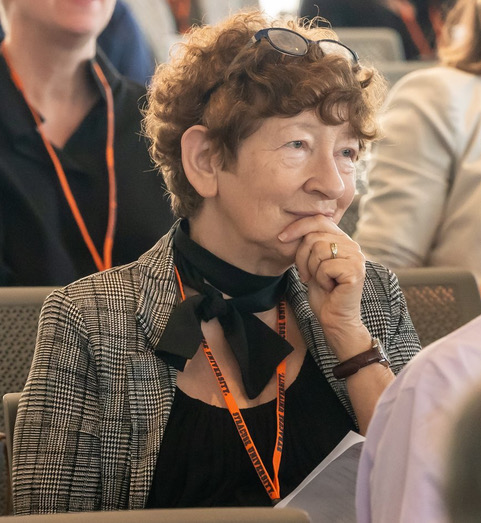Keynote Speakers
Welcome and Opening Keynote
Systematic Inclusive Design: From GenderMag to SocioeconomicMag
Keynote Summary: How can software professionals systematically assess whether their software supports diverse users? And if they find problems, how can they fix them? Our team’s prior research revealed software’s failures to support different genders’ user experiences equitably, and then produced the GenderMag method to address this problem, which is now in use around the world. Today we present our research toward a new method, SocioeconomicMag, to help improve software’s equitability across socioeconomically diverse users. SocioeconomicMag is just emerging, and we are actively looking for field collaborators to try it out in the field.

Keynote Speaker:
Margaret Burnett
Oregon State University
Bio: Margaret Burnett is a University Distinguished Professor in the School of EECS at Oregon State University. She holds 4 patents; has received 10 best paper awards/honorable mentions and 5 Long-Term Impact awards; and has received multiple mentoring, service, and research awards. She is an ACM Fellow, and was elected to ACM’s CHI Academy in 2016 as one of the “principal leaders of the field” of HCI. In 2023, she became a member of the Academic Alliance on AI Policy (AAAIP). Burnett’s research runs the gamut of human-centric aspects of making software better for the people who use it, with an emphasis on inclusive design. She began her work in inclusive design by debunking the belief that software is gender-neutral. She then devised a set of a systematic methods to address inequities in software’s user experiences. For example, she co-leads the team that created GenderMag (gendermag.org), a software inspection process that uncovers user-facing gender biases in software from smart systems to programming environments. She is now working on SocioEconomicMag, a systematic method which aims to find and fix software’s socioeconomic-inclusivity “bugs”. Her work has impacted commercial software used by millions of people.
Closing Keynote
Data beyond life: interactions in the face of death
Keynote Summary: About 15 years ago, we began a journey of research and debates on death and technologies, especially at events in the area of Human-Computer Interaction. The persistence or not of users’ digital data beyond their lives is something that needs to be managed in advance, to effectively process data and/or posthumous interactions. In some systems, there are ways to manage future legacies, but it is necessary to advance in this field through research and scientific and technological development. Over the years, the Data Beyond Life (DAVI) project, with the support of many collaborators from different areas of knowledge, has addressed the topic in different ways, which will be explored in this talk. To move forward, it is also important that taboos and beliefs about death are addressed in an educational context so that users can think about the destination of their digital data in a more comfortable, natural, and responsible way. Therefore, this talk invites participants to think more about the topic and together, we can continue to advance and support society by offering socially responsible solutions that provide greater well-being to people.

Keynote Speaker:
Cristiano Maciel
Universidade Federal de Mato Grosso
Bio: Cristiano Maciel holds a PhD in Computer Science and a post-doctorate in Information Systems; he is a professor at the Institute of Computing, the Graduate Programs in Education and Applied Computing, and a researcher at LAVI and LêTECE at the Federal University of Mato Grosso. He is a CNPq Research Productivity Fellow, vice-president of the Brazilian Computer Society, consultant for the Digital Girls Program, and ELLAS International Research Network coordinator. Among other areas, his interests include Internet applications, human-computer interaction, e-government, post-mortem digital legacy, technologies in education and STE(A)M, gender, and race.
Master Class
GenderMag Master Class -- Learning it by Doing it
Master Class Summary: GenderMag pinpoints gender-inclusivity “bugs” in software and other tech artifacts (web sites, Open-Source project sites, online course materials, software documentation, etc.). To learn GenderMag by trying it out, in this workshop, we will work together to do a GenderMag evaluation on system(s) of your choice. You are strongly encouraged to bring a system you are working on, so that we can evaluate it together. I will also bring a system in wide use in universities. If you bring your own systems, we can work on those; if you don’t you can work on the one I bring. We’ll work together in small groups on these evaluations, to find the gender-inclusivity “bugs” and fix them. You’ll leave with the ability to do GenderMag evaluations on the software and other tech that you create as part of your research or professions. Please bring a laptop, the system or prototype you want to evaluate (if you’re bringing one), and pens/pencils to write with.

Lecturer:
Margaret Burnett
Oregon State University
Bio: Margaret Burnett is a University Distinguished Professor in the School of EECS at Oregon State University. She holds 4 patents; has received 10 best paper awards/honorable mentions and 5 Long-Term Impact awards; and has received multiple mentoring, service, and research awards. She is an ACM Fellow, and was elected to ACM’s CHI Academy in 2016 as one of the “principal leaders of the field” of HCI. In 2023, she became a member of the Academic Alliance on AI Policy (AAAIP). Burnett’s research runs the gamut of human-centric aspects of making software better for the people who use it, with an emphasis on inclusive design. She began her work in inclusive design by debunking the belief that software is gender-neutral. She then devised a set of a systematic methods to address inequities in software’s user experiences. For example, she co-leads the team that created GenderMag (gendermag.org), a software inspection process that uncovers user-facing gender biases in software from smart systems to programming environments. She is now working on SocioEconomicMag, a systematic method which aims to find and fix software’s socioeconomic-inclusivity “bugs”. Her work has impacted commercial software used by millions of people.
